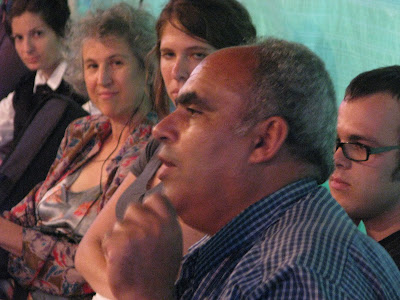 People will say that my blog is all about gloomy Palestinian slums (my previous post was about Silwan). let them say so. There are certain things about gloomy Palestinian slums that make them interesting:
People will say that my blog is all about gloomy Palestinian slums (my previous post was about Silwan). let them say so. There are certain things about gloomy Palestinian slums that make them interesting: 1. They are right in our backyard, though we almost never go there (My walk through Silwan was my first time visiting the neighborhood, and I was born in Jerusalem.)
2. We are very much responsible for how gloomy they are.
3. They are an endangered species worth seeing now, before Israel manages to demolish them entirely.
Take the "village" of Dahmash, in a fact a neighborhood of the city of Ramla, fifteen minutes southeast Tel-Aviv. It's not even "Palestinian" per-se, since its residents are citizens of Israel. Then again, they are Arabs, and therefore have somewhat limited rights. Let us observe: what rights do I have as a Jewish Israeli that the people of Dahmash don't?
1. My town appears on the maps. The state agrees that it exists. Dahmash does not officially exist, despite having been there since before the founding of the State of Israel.
2. I get my mail delivered.
3. my garbage gets collected. (points 2 and 3 are only fully true now, once I moved to Tel-Aviv from an Arab neighborhood in Jaffa.
4. I don't have to acquire electricity by improvised wire from my neighbor.
5. I don't have a huge auto-dump-site placed right next to my house, polluting the land and air for the children of the neighborhood. Needless to say, Dahmash was there before the dump's location was chosen, but again, it was there physically, not officially.
 7. No walls are built around my community, protecting other communities from the "thieving nature" of me and my neighbors.
7. No walls are built around my community, protecting other communities from the "thieving nature" of me and my neighbors. 6. I can walk down the street directly to my house. Currently the people of Dahmash can as well: A gravel road winds by the dump site and leads them to the main road, but the municipal authorities surrounding the village are planning to block the road and force the 600 residents to make their way through the orange groves.
8. The police do not come daily to inspect my deeds.
9. No one is threatening to demolish my home.
Currently 13 Dahmash houses are set to be demolished for "illegal construction". Something is of course to be said for town planning and building ordinances, but not when those are dictated by racism. Dahmash's people can't possibly get a building permit, while residents of the surrounding Jewish-Israeli communities, the "Moshavim", can build freely. Those Moshavim are younger than the village and were founded with the blessing of the state.
A few years ago five homes in Dahmash were demolished. The people of the village tell of the Israeli demolition team and how they emptied the houses of the families' belongings. "They found the children's schoolbooks and threw them out with the trash." Tells Arafat, "The children ran over to them, confused, in tears."
which brings me to the final right I have which the people of Dahmash are denied:
10. I am being treated as a human being.
 The final hearing over the demolition is to take place tomorrow. The people of the village have no real hope.
The final hearing over the demolition is to take place tomorrow. The people of the village have no real hope. On Thursday we came there as activists of "Culture Guerrilla". We listened to their stories.
 and then held a poetry event in Hebrew and Arabic.
and then held a poetry event in Hebrew and Arabic. 
 The Culture Guerilla strategy is to later use the poems and the documentation of the event to try and stir media buzz around the issue. These activities bore fruit in the past, especially in matters of labor disputes. Most recently, a judge quoted one of the poems while ruling in favor of the Eckerstein factory laborers, who sought to organize.
The Culture Guerilla strategy is to later use the poems and the documentation of the event to try and stir media buzz around the issue. These activities bore fruit in the past, especially in matters of labor disputes. Most recently, a judge quoted one of the poems while ruling in favor of the Eckerstein factory laborers, who sought to organize. However, when it comes to the right of Arabs we don't expect much of an effect. The state of Israel is full of "unrecognized villages" most of them Bedouin communities, some of considerable size. Under the Zionist ethos, there's no chance for them to change status.
The best we can do is be good neighbors and try and give a good show. The people of the village were extremely hospitable to us. they made us feel completely at home at their home, which is hardly a home and may soon no longer be there at all.

3 comments:
Have you read the book Hollow Land? Your comment about illegal construction made me think of it, its a great documentation of many of the policies that Dahmash is facing.
http://medassist.org/media/buypropecia/#24982 propecia results women - buy cheap propecia no prescription
This is a powerful reminder of how important it is to advocate for equality.
Post a Comment